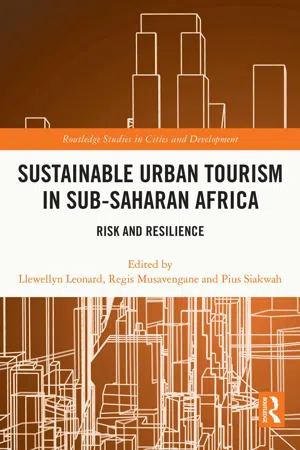
Sustainable Urban Tourism in Sub-Saharan Africa
Risk and Resilience
- 296 pages
- English
- ePUB (mobile friendly)
- Available on iOS & Android
Sustainable Urban Tourism in Sub-Saharan Africa
Risk and Resilience
About This Book
This book investigates urban tourism development in Sub-Saharan Africa, highlighting the challenges and risks involved, but also showcasing the potential benefits.
Whilst much is written on Africa's rural environments, little has been written about the tourism potential of the vast natural, cultural and historical resources in the continent's urban areas. Yet these opportunities also come with considerable environmental, social and political challenges. This book interrogates the interactions between urban risks, tourism and sustainable development in Sub-Saharan African urban spaces. It addresses the underlying issues of governance, power, ownership, collaboration, justice, community empowerment and policies that influence tourism decision-making at local, national and regional levels. Interrogating the intricate relationships between tourism stakeholders, this book ultimately reflects on how urban risk can be mitigated, and how sustainable urban tourism can be harnessed for development.
The important insights in this book will be of interest to researchers and practitioners across Tourism, Geography, Urban Development, and African Studies.
Frequently asked questions
1 Urban risk and tourism in Africa
An overview
1Introduction
2Contextualising urbanisation, urban risk and tourism
Table of contents
- Cover
- Half Title
- Series Page
- Title Page
- Copyright Page
- Table of Contents
- List of Tables
- List of Figures
- List of Contributors
- Acknowledgements
- Preface
- Chapter 1: Urban risk and tourism in Africa: An overview
- Theme 1: Urban tourism and environmental pollution risks
- Theme 2: Peace tourism, battlefields and war risks
- Theme 3: Tourism, climate change and flood risks
- Theme 4: Inclusive urban tourism and enclaves
- Index